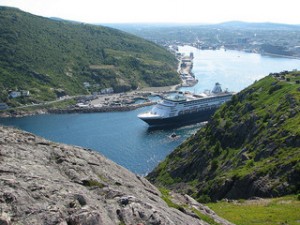
Travelers take cruises to exotic places where they don’t necessarily get an authentic experience. Photo courtesy of Colin Delaney/ Flickr Creative Commons
With the arrival of spring comes the exodus of college students from their stressful, dreary campuses to the soft, sandy beaches of the tropics. Most travel to places like Mexico and the Dominican Republic where they can lounge in the sun and forget about their schoolwork. However, though they are traveling to exotic places with interesting cultures, they are not necessarily authentically interacting with the people they meet and the places they see.
A group of students from Barnard College in Manhattan went on a cruise for their spring break which stopped in Mexico and Jamaica. After their trip, they found their experiences to be very inauthentic. Emily Kawai, a senior at Barnard, said that while in Jamaica, her tour guide and the locals “hyped up the stereotypes for the tourists.” She observed that many people were wearing the Rastafarian colors and saying quotes from Bob Marley. “They wanted to give the tourists what they expected,” she says. Gaby Ittah, also a senior at Barnard, agreed with Emily, saying that “the ports milk the tourism industry.”
Ecotourism, on the other hand, strives to create a cohesive travel experience that includes the community in an authentic way. Ecotourism encourages sustainable tourism and as a result, businesses involved in ecotourism put a lot of emphasis on community building and outreach within the communities that they are operating.
According to Regina Scheyvens, author of the case study entitled “Ecotourism and the Empowerment of Local Communities”, businesses in the ecotourism industry “should only be considered successful if local communities have some measure of control over them and if they share equitably in the benefits emerging from ecotourism activities.” This means that members of the local community should see the economic benefits of tourism as well as the community benefits, such as business owners giving back to the whole community and not just their employees.
In an article written by Amanda Stronza and Javier Gordillo on the community’s relationship to tourism, they point out the complexities of ecotourism’s effect on the community. Though the overarching goal of ecolodges and ecotourism is centered on the environment, their economic success “does not generate enough support to provide sufficient incentives for conservation.” The community may experience the economic benefit of ecotourism, but it does not encourage them to rally behind conservation themselves. In their article, the authors point out that it is not the economic success that will encourage conservation, but in fact, it is the “participation in ownership and management [that] may lead to new learning and greater local cohesion.”
In keeping with Stronza and Gordillo then, the best ecolodges are not necessarily the ones that do the most to protect nature, but are in fact the hotels that support the community in order to protect nature.
In Costa Rica, there is a lot of social and political focus on education. In the total population, 96.3 percent of citizens are literate, which is the highest literacy rate in Central America. The emphasis on education is a result of the abolition of the national army in 1948. Rather than funding the military, the Costa Rican government instead put those funds towards education.
As a result of the emphasis on education, many ecolodges contribute to schools in their communities, thereby allowing students to excel academically and professionally. La Paloma, an ecolodge on the Osa Peninsula, exemplifies giving back to the community through education. La Paloma sells t-shirts and cards to guests and all proceeds go to materials for classrooms as well as repair of the infrastructure of the local school. In doing so, La Paloma encourages the education of children, and as a result, encouraging them to go further in life.
The impact that ecotourism has on the local community has the potential to be significant. By supporting local schools, and by encouraging guests to support local artisans, farmers, and shops, ecotourism has the potential to allow local people to elevate themselves financially while simultaneously improving their quality of life. Ecolodges, which are normally located in rustic locations off the beaten track, bring travelers into places that might not have otherwise been touched by tourists. That thereby encourages the economy to grow, and in doing so, creates a market where natives can create their own businesses that help tourism grow even more.
But even with the positive aspects of ecotourism, such as protection of the environment and contribution to the local community, there are some negatives that are created by ecotourism. The question is, do the negatives outweigh the positives?